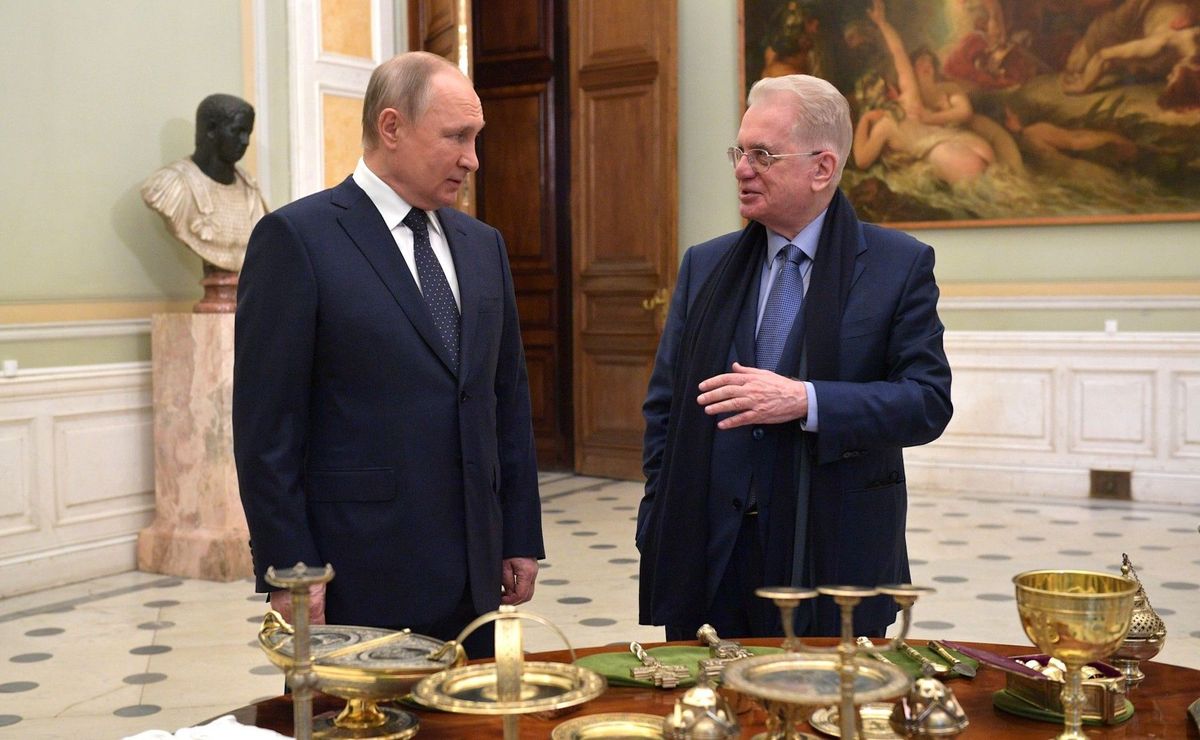Canada has included Mikhail Piotrovsky, director of the State Hermitage Museum in St. Petersburg, on its list of Russian cultural figures sanctioned for supporting the invasion of Ukraine. Other than Ukraine, Canada is the first country to impose sanctions on Piotrovsky, who has been a prominent Russian cultural voice in support of the invasion.
The amendment to Canada’s Special Economic Measures Act published earlier this month in the government’s official Canada Gazette states that: “Russia is using its celebrities in the cultural sector to promote the Kremlin’s propaganda about the invasion of Ukraine. Russia is systematically destroying Ukrainian culture as part of its ongoing violation of Ukrainian sovereignty and territorial integrity.”
Since last June, Piotrovsky has described Hermitage exhibitions abroad as a “powerful cultural offensive” comparable to the “special operation”—Kremlin terminology for the war—and described war as “a means of cultural exchange”. He has been connected to Russian president Vladimir Putin, who is from St. Petersburg, since the 1990s.
Canada, which has a large Ukrainian diaspora, has been a major participant in international sanctions against Russian individuals and entities following the annexation of Crimea, Ukraine’s Black Sea peninsula, in 2014. The cultural list includes Olga Lyubimova, Russia’s culture minister, who was first sanctioned by the European Union and the United States months ago. Lyubimova was sanctioned by the UK in July.
Others on Canada’s new list include Oscar-winning film director and Yaroslav Dronov, a rock singer who goes by the name Shaman and whose hits such as “I am Russian” incorporate Soviet and Nazi aesthetics. Alla Manilova, a former deputy culture minister who was named director of the State Russian Museum in April, is also on the list.
A spokesperson with the State Hermitage Museum’s press service said that it “is not commenting” on sanctions against Piotrovsky and other cultural figures.
Aleksandr Shkolnik, director of the Moscow’s Museum of the Great Patriotic to War, built to commemorate the Second World War but now devoting significant attention propaganda against Ukraine and the North Atlantic Treaty Organization (Nato), was the first Russian museum director to be sanctioned, in May 2022 by the UK and Australia.
The close relationship between Canada and the Hermitage goes back to the 1990s, when Robert Kaszanits, former assistant director of Canada’s National Gallery, spearheaded efforts to preserve the Hermitage’s collections. He was an author, with Piotrovsky, of the catalog to Voyage into Myth: Gaugin to Matisse, French Painting from The Hermitage Museum, which opened at the Art Gallery of Ontario in 2022.
Kaszanits incorporated the State Hermitage Foundation of Canada in 1998. Canadian business records show that it was dissolved in 2019. He led or participated in many trips to Russia, including one in 2018 by the Royal Ontario Museum titled “Heavenly Russia: Aerospace and Imperial Treasures”, and was praised that year at Canadian Senate hearings for fostering cultural diplomacy and receiving a medal from Putin.
A 2015 report on the Hermitage website shows Kaszanits meeting with Piotrovsky at the museum as part of a delegation of the Canadian Friends of the Hermitage. The organization is still listed on the museum’s site along with international support groups; a Hermitage spokesperson says the Canadian group “has suspended its activities for the time being”. Kaszanits was accompanied by Jack Lohman, at the time director of the Royal British Columbia Museum. Kaszanits declined to comment for this story.
Avra Gibbs-Lamey, a spokesperson for the Canadian War Museum, told The Art Newspaper that the public museum does not “typically comment on policy decisions taken by the Canadian government”, but “we are saddened every time there is news of destruction of heritage and museums as a result of conflict”.


